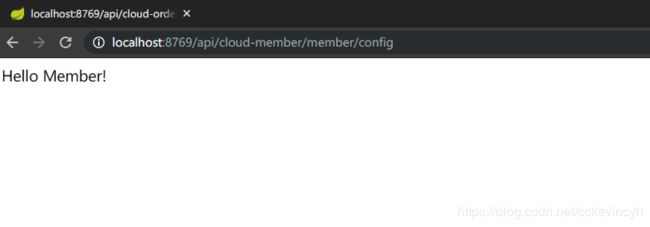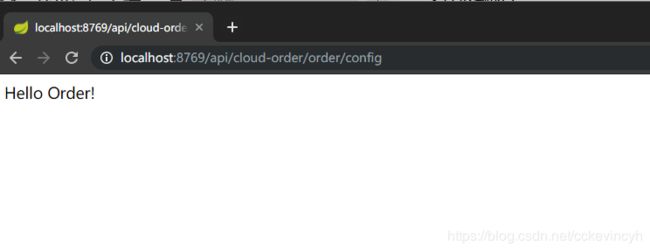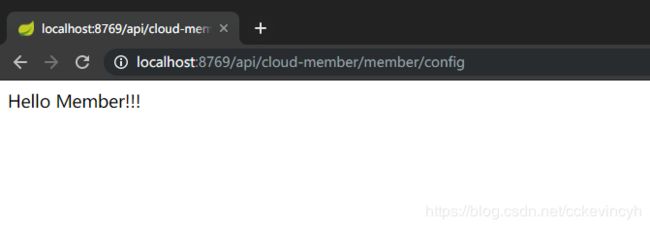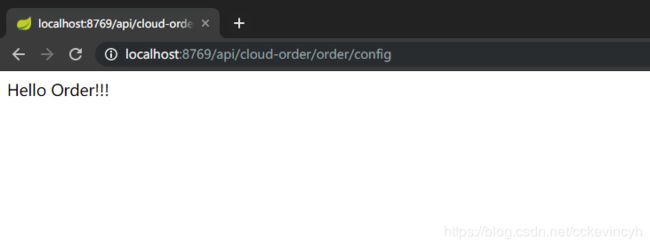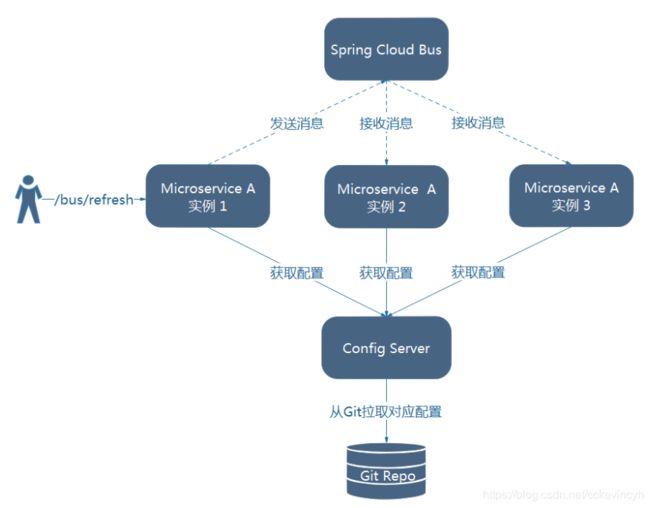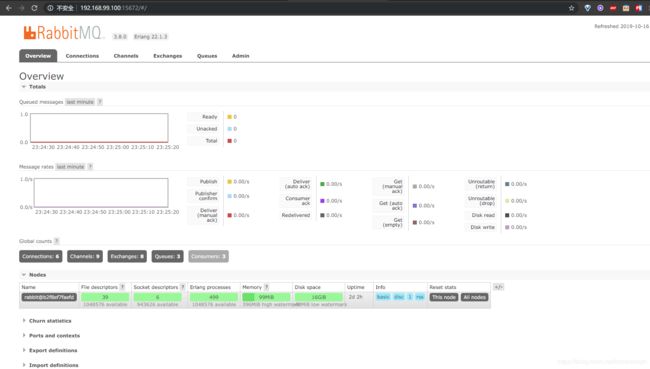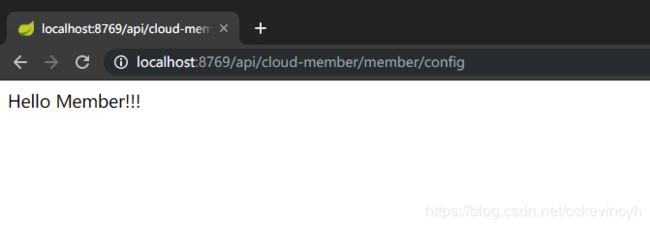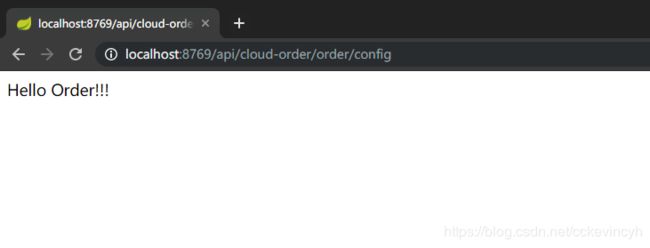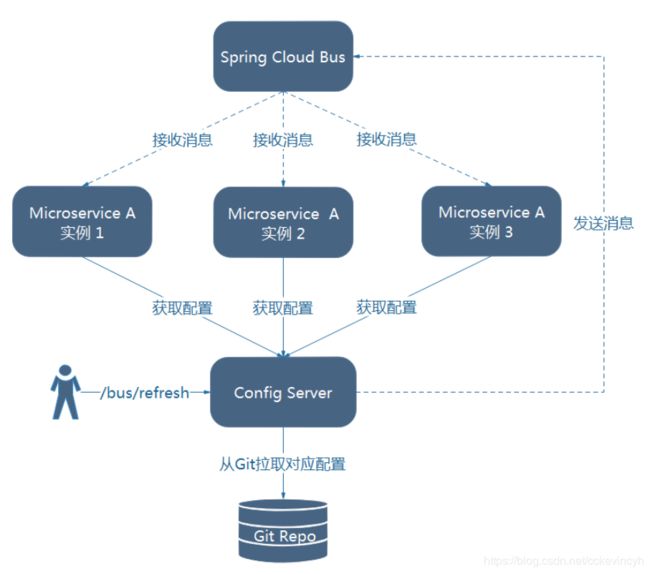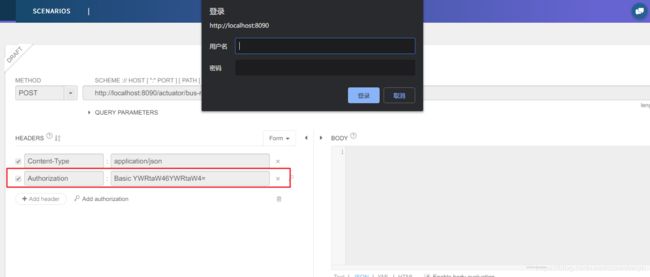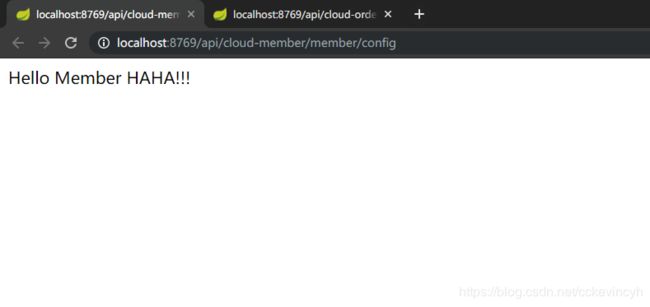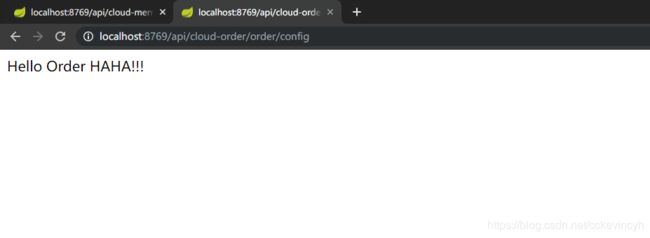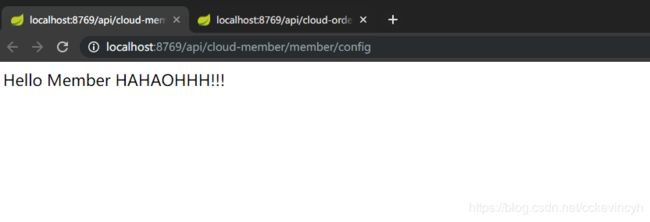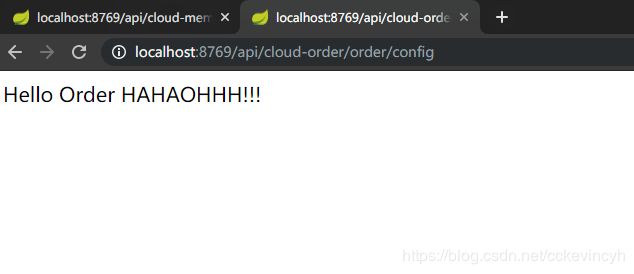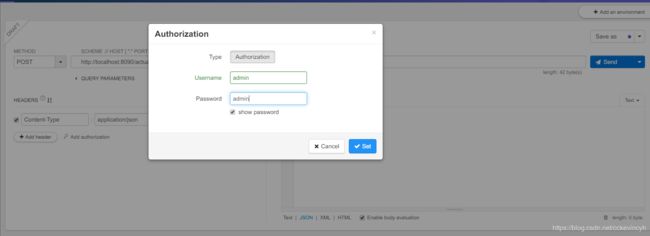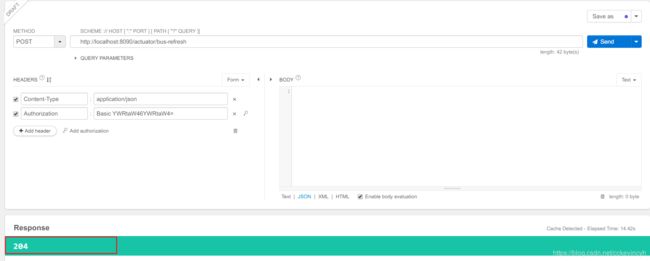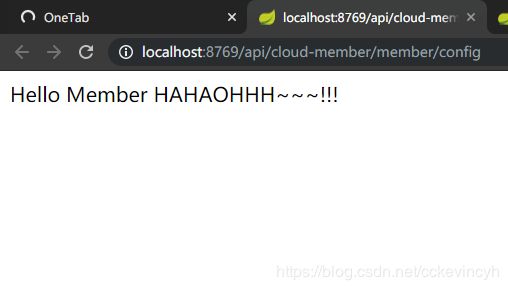【Spring Cloud 基础设施搭建系列】Spring Cloud Demo项目 使用Spring Cloud Bus自动刷新配置
文章目录
- 使用/refresh 端点手动刷新配置
- 使用Spring Cloud Bus自动刷新配置
- Spring Cloud Bus简介
- Docker安装RabbitMQ
- 实现自动刷新
- 架构改进
- Spring Cloud Config 使用安全认证后无法刷新配置端点
- 参考
- 源代码
使用/refresh 端点手动刷新配置
很多场景下,需要在运行期间动态调整配置。如果配置发生了修改,微服务要如何实现配置的刷新呢?
之前我们在git上更改了配置文件,还需要重启服务才能够读取到最新的配置。
如果要想实现配置刷新,须对之前config client端的代码进行一点改造。
下面我们开始改造之前的cloud-service-member和cloud-service-order服务。
- 为项目添加spring-boot-starter-actuator的依赖,该依赖包含了/refresh端点,用于配置的刷新。
<dependency>
<groupId>org.springframework.bootgroupId>
<artifactId>spring-boot-starter-actuatorartifactId>
dependency>
- 在Controller 上添加注解@RefreshScope。添加@RefreshScope的类会在配置更改时得到特殊的处理。
package com.cc.cloud.member.controller;
import com.cc.cloud.member.feign.OrderFeign;
import com.google.common.collect.Lists;
import org.springframework.beans.factory.annotation.Autowired;
import org.springframework.beans.factory.annotation.Value;
import org.springframework.cloud.context.config.annotation.RefreshScope;
import org.springframework.http.HttpStatus;
import org.springframework.web.bind.annotation.GetMapping;
import org.springframework.web.bind.annotation.RequestMapping;
import org.springframework.web.bind.annotation.ResponseStatus;
import org.springframework.web.bind.annotation.RestController;
import java.util.List;
@RefreshScope
@RestController
@RequestMapping("/member")
public class MemberController {
private OrderFeign orderFeign;
@Value("${cloud.service.member}")
private String memberConfig;
@Autowired
public void setOrderFeign(OrderFeign orderFeign) {
this.orderFeign = orderFeign;
}
@RequestMapping("/orders")
@ResponseStatus(HttpStatus.OK)
public List<String> getOrderList() {
return orderFeign.getAllOrderList();
}
@RequestMapping("/members")
@ResponseStatus(HttpStatus.OK)
public List<String> getMemberList() {
List<String> memberList = Lists.newArrayList();
memberList.add("member 1");
memberList.add("member 2");
memberList.add("member 3");
return memberList;
}
@GetMapping("/config")
@ResponseStatus(HttpStatus.OK)
public String getMemberConfig(){
return memberConfig;
}
}
package com.cc.cloud.order.controller;
import com.cc.cloud.order.feign.MemberFeign;
import com.google.common.collect.Lists;
import org.slf4j.Logger;
import org.slf4j.LoggerFactory;
import org.springframework.beans.factory.annotation.Autowired;
import org.springframework.beans.factory.annotation.Value;
import org.springframework.cloud.context.config.annotation.RefreshScope;
import org.springframework.http.HttpStatus;
import org.springframework.web.bind.annotation.GetMapping;
import org.springframework.web.bind.annotation.RequestMapping;
import org.springframework.web.bind.annotation.ResponseStatus;
import org.springframework.web.bind.annotation.RestController;
import java.util.List;
@RefreshScope
@RestController
@RequestMapping("/order")
public class OrderController {
private final Logger logger = LoggerFactory.getLogger(OrderController.class);
private MemberFeign memberFeign;
@Value("${cloud.service.order}")
private String orderConfig;
@Autowired
public void setMemberFeign(MemberFeign memberFeign) {
this.memberFeign = memberFeign;
}
@RequestMapping("/members")
@ResponseStatus(HttpStatus.OK)
public List<String> getMemberList() {
return memberFeign.getAllMemberList();
}
@GetMapping("/orders")
@ResponseStatus(HttpStatus.OK)
public List<String> getOrders() {
List<String> orders = Lists.newArrayList();
orders.add("order 1");
orders.add("order 2");
return orders;
}
@GetMapping("/config")
@ResponseStatus(HttpStatus.OK)
public String getOrderConfig(){
return orderConfig;
}
}
- 并且在cloud-service-member中添加如下配置:
cloud:
service:
member: 'Hello Member!'
在cloud-service-order中添加如下配置:
cloud:
service:
order: 'Hello Order!'
-
然后启动cloud-eureka,cloud-zuul,cloud-service-member,cloud-service-order,cloud-config-server服务。
-
然后访问 http://localhost:8769/api/cloud-member/member/config
然后访问 http://localhost:8769/api/cloud-order/order/config
- 然后我们分别修改cloud-service-member和cloud-service-order的配置.
cloud:
service:
member: 'Hello Member!!!'
cloud:
service:
order: 'Hello Order!!!'
- 然后我们通过发送POST请求到
/refresh端点去刷新配置,如下。
$ curl -X POST http://localhost:8762/actuator/refresh
["config.client.version","cloud.service.member"]
$ curl -X POST http://localhost:8765/actuator/refresh
["config.client.version","cloud.service.order"]
- 然后重新访问 http://localhost:8769/api/cloud-member/member/config
然后重新访问 http://localhost:8769/api/cloud-order/order/config
使用Spring Cloud Bus自动刷新配置
前面我们使用/refresh端点手动刷新配置,但如果所有微服务节点的配置都需要手动去刷新,工作量可想而知。不仅如此,随着系统的不断扩张,会越来越难以维护。因此,实现配置的自动刷新是很有必要的,下面我们将使用如何Spring Cloud Bus实现配置的自动刷新。
Spring Cloud Bus简介
Spring Cloud Bus使用轻量级的消息代理(例如RabbitMQ、Kafka等)连接分布式系统的节点,这样就可以广播传播状态的更改(例如配置的更新)或者其他的管理指令。可将Spring Cloud Bus想象成一个分布式的Spring Boot Actuator。使用Spring Cloud Bus后的架构如下图所示。
微服务A的所有实例都通过消息总线连接到了一起,每个实例都会订阅配置更新事件。当其中一个微服务节点的/bus/refresh端点(当前版本已经修改成/bus-refresh端点)被请求时,该实例就会向消息总线发送一个配置更新事件,其他实例获得该事件后也会更新配置。
Docker安装RabbitMQ
下面我们需要使用RbbitMQ作为消息总线。所以我们先介绍如何在Docker中安装RabbitMQ。
- 获取带有管理页面的RabbitMQ镜像
$ docker pull rabbitmq:management
management: Pulling from library/rabbitmq
5667fdb72017: Already exists
d83811f270d5: Already exists
ee671aafb583: Already exists
7fc152dfb3a6: Already exists
511da93b5ba5: Already exists
34ed6c3ce222: Already exists
efe6df6279a7: Already exists
3ca75f81239b: Already exists
ded8ef942d92: Already exists
c319281f11ad: Already exists
b8109dc0ceda: Pull complete
1596b64dcd88: Pull complete
Digest: sha256:4cab9fe2eed84840e60ecb99b0a902883ef6d26f4dab2439d1119b6bdab4f2c8
Status: Downloaded newer image for rabbitmq:management
docker.io/library/rabbitmq:management
下载速度慢的话可以换成国内的镜像源(比如阿里云的镜像仓库),我这里使用的是Docker ToolBox,可以参考下面的文章:
Docker Toolbox下配置国内镜像源-阿里云加速器
docker更换镜像源
如何修改Windows上Docker的镜像源
Windows上Docker Toolbox修改镜像源
- 建立容器运行镜像并建立好端口号映射
docker run -d --name rabbitmq -p 15672:15672 -p 5672:5672 rabbitmq:management
然后我们访问 http://192.168.99.100:15672 (IP是docker machine的IP),然后用户名和密码都是guest
实现自动刷新
我们需要对我们的config client端进行改造,也就是对我们之前的cloud-service-member和cloud-service-order进行改造。
- 首先加入spring cloud bus的pom依赖。
<dependency>
<groupId>org.springframework.cloudgroupId>
<artifactId>spring-cloud-starter-bus-amqpartifactId>
dependency>
- 我们需要把RabbitMQ的配置加入到application.yml中。
spring:
rabbitmq:
host: 192.168.99.100
port: 5672
username: guest
password: guest
当然我们需要开启bus-refresh这个端点,我们这里直接暴露出全部的端点。
management:
endpoints:
web:
exposure:
include: "*"
ps:需要刷新配置的地方需要打上@RefreshScope注解
这样我们的客户端就改造完成了。
- 启动cloud-eureka,cloud-zuul,cloud-config-server,cloud-service-member,cloud-service-order。
我们访问 http://localhost:8769/api/cloud-member/member/config
访问 http://localhost:8769/api/cloud-order/order/config
加下来我们修改一下配置,之后push到git 仓库上。
然后通过如下URL刷新配置:
$ curl -X POST http://localhost:8762/actuator/bus-refresh
注意下这里是访问/actuator/bus-refresh而不是/bus/refresh
重新访问 http://localhost:8769/api/cloud-member/member/config
重新访问 http://localhost:8769/api/cloud-order/order/config
说明两个客户端均已经拿到了最新配置文件的信息。
架构改进
在前面的示例中,通过请求某个微服务/bus/refresh端点(当前版本已经修改成/bus-refresh端点)的方式来实现配置刷新,但这种方式并不优雅。原因如下:
- 破坏了微服务的职责单一原则。业务微服务只应关注自身业务,不应承担配置刷新的职责。
- 破坏了微服务各节点的对等性。
- 有一定的局限性。例如,微服务在迁移时,网络地址常常会发生变化。此时如果想自动刷新配置,就不得不修改WebHook的配置。
将Config Server也加入到消息总线中,并使用Config Server的/bus/refresh端点来实现配置的刷新。这样,各个微服务只需要关注自身的业务,而不再承担配置刷新的职责。
新的架构如下:
我们需要在config server端的代码做一些改动,来支持bus/refresh
- 我们需要把
spring-cloud-starter-bus-amqp依赖加进来,增加对消息总线的支持
<dependency>
<groupId>org.springframework.cloudgroupId>
<artifactId>spring-cloud-starter-bus-amqpartifactId>
dependency>
- 我们需要加入RabbitMQ的配置到config server的application.yml文件。
spring:
rabbitmq:
host: 192.168.99.100
port: 5672
username: guest
password: guest
还有需要把bus-refresh的端点暴露出来。
management:
endpoints:
web:
exposure:
include: "*"
Spring Cloud Bus会向外提供一个http接口,即/actuator/bus-refresh。我们可以将这个接口配置到远程的git上,当git上的文件内容发生变动时,就会自动调用/bus-refresh接口。Bus就会通知config-server,config-server会发布更新消息到消息队列中,其他服务订阅到该消息就会信息刷新,从而实现整个微服务进行自动刷新。
Spring Cloud Config 使用安全认证后无法刷新配置端点
现在我们直接启动cloud-eureka还有cloud-config-server。然后我们通过postman工具或者其他Rest API工具测试一下。
我们通过POST请求 http://localhost:8090/actuator/bus-refresh
结果提示我们需要认证,这里是一个 HTTP Basic认证。
因为我们为config server加入了Spring Security的依赖,Spring Boot 会默认启用Basic认证拦截所有浏览器请求,你可以设置为spring.security.basic.enabled 为false来禁用。
但是Spring Boot 2以后,已经把spring.security.basic.enabled给去掉了,
所以我们推荐我们去创建一个自己的WebSecurityConfig类去实现WebSecurityConfigAdapter。然后在里面配置权限过滤的逻辑。
默认的配置如下(默认是开启的):
/**
* http.authorizeRequests().anyRequest().authenticated().and().formLogin().and().httpBasic();
**/
protected void configure(HttpSecurity http) throws Exception {
this.logger.debug("Using default configure(HttpSecurity). If subclassed this will potentially override subclass configure(HttpSecurity).");
((HttpSecurity)((HttpSecurity)((AuthorizedUrl)http.authorizeRequests().anyRequest()).authenticated().and()).formLogin().and()).httpBasic();
}
通过调用authorizeRequests()和 anyRequest().authenticated()就会要求所有进入应用的
HTTP请求都要进行认证。Spring Security支持基于表单的登录以及HTTP Basic方式的认证。formLogin()方式会生成默认登录页面。httpBasic()则是Http Basic 验证,也就是上图我们请求的时候会弹出让你输入用户用和密码,你也可以通过http://${user}:${password}@${host}:${port}/xxx/这种方式登录。还有就是可以通过Rest API 工具,在请求中加入Authorization Headers 进行请求。一会下面会演示这两种方式。
然后我们通过Rest API工具带Authorization Header进行请求,发现并没有起效果,依然是弹出让我们登录。
执行如下命令,发现执行完毕之后也是没有刷新配置。
curl -X POST http://admin:admin@localhost:8090/actuator/bus-refresh
这是为什么?默认的配置上已经开启了HTTP Basic认证了,为什么我们通过这种方式还是认证不了?原因就是Spring Security 为了防止跨站提交攻击提供了CSRF保护功能,该功能在Spring Security 3时就已经存在,默认是不启用,Spring Security 4默认启用了。
启用csrf后,所有http请求都被会CsrfFilter拦截,而CsrfFilter中有一个私有类DefaultRequiresCsrfMatcher。
public final class CsrfFilter extends OncePerRequestFilter {
//...
private static final class DefaultRequiresCsrfMatcher implements RequestMatcher {
private final HashSet<String> allowedMethods;
private DefaultRequiresCsrfMatcher() {
this.allowedMethods = new HashSet(Arrays.asList("GET", "HEAD", "TRACE", "OPTIONS"));
}
public boolean matches(HttpServletRequest request) {
return !this.allowedMethods.contains(request.getMethod());
}
}
}
从这段源码可以发现,POST方法被排除在外了,也就是说只有GET|HEAD|TRACE|OPTIONS这4类方法会被放行,其它Method的http请求,都要验证_csrf的token是否正确,而通常post方式调用rest服务时,又没有_csrf的token,所以校验失败。
所以我们需要禁用CSRF保护功能,所以我们需要加上http.csrf().disable(),代码如下:
package com.cc.cloud.config.server.security;
import org.springframework.context.annotation.Configuration;
import org.springframework.security.config.annotation.web.builders.HttpSecurity;
import org.springframework.security.config.annotation.web.configuration.EnableWebSecurity;
import org.springframework.security.config.annotation.web.configuration.WebSecurityConfigurerAdapter;
import org.springframework.security.config.http.SessionCreationPolicy;
@Configuration
@EnableWebSecurity
public class WebSecurityConfig extends WebSecurityConfigurerAdapter {
@Override
protected void configure(HttpSecurity http) throws Exception {
http.sessionManagement().sessionCreationPolicy(SessionCreationPolicy.NEVER);
http.csrf().disable();//禁用CSRF
http.authorizeRequests().anyRequest().authenticated().and().formLogin().and().httpBasic();
}
}
我们重启cloud-config-server服务。
我们访问 http://localhost:8769/api/cloud-member/member/config 和 http://localhost:8769/api/cloud-order/order/config
然后我们修改配置,push到远程仓库。
然后执行下面的命令。
curl -X POST http://admin:admin@localhost:8090/actuator/bus-refresh
等待执行完毕之后,重新刷新页面,就可以看到如下结果。
然后我们在重新修改配置。试试用Rest API工具进行请求。
首先加上Authorization的HEADERS
然后可以发现返回是204.
重新刷新页面,可以看到如下结果。
这样就完成了我们使用Spring Cloud Bus自动刷新配置。
参考
Spring Security 认证方式的深度思考
SpringBoot 使用 Spring Security 开启了 CSRF 防跨站攻击防护后 POST 方法无效
spring security 防CSRF攻击
Spring Security 初识(四)–请求拦截
Spring Security中HttpSecurity常用方法及说明
初步理解Spring Security并实践
使用Spring Security实现HTTP Basic认证
Property ‘security.basic.enabled’ is Deprecated: The security auto-configuration is no longer customizable
spring cloud config 使用用户认证后 刷新配置端点bus-refresh 403
一起来学SpringBoot | 第十四篇:强大的 actuator 服务监控与管理
SpringBoot2.0 Config客户端自动刷新时没有/bus/refresh端点
spring-cloud-config 使用安全认证后 刷新配置端点 /actuator/bus-refresh 返回403
springcloud(九):配置中心和消息总线(配置中心终结版)
Spring Cloud构建微服务架构(七)消息总线
Config Server——使用Spring Cloud Bus自动刷新配置
springcloud(九):配置中心和消息总线(配置中心终结版)
Spring cloud config Actuator健康监测
SpringCloud学习系列之五-----配置中心(Config)和消息总线(Bus)完美使用版
源代码
https://gitee.com/cckevincyh/spring-cloud-demo/tree/config-refresh/
https://gitee.com/cckevincyh/spring-cloud-demo/tree/config-bus-refresh-v1/
https://gitee.com/cckevincyh/spring-cloud-demo/tree/config-bus-refresh-v2/
